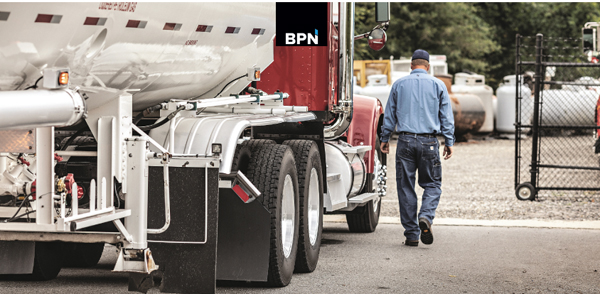Monday, September 30, 2019
(September 30, 2019) — With the national driver shortage in full swing, we are seeing upward pressure on wages. There are many articles that can be written on the driver shortage, however, as our focus is on business value, we will stick to the effect on value.

Over the last two years, we have seen driver wages increase by as much as 10% annually. Companies are offering signing bonuses, low- or no-cost medical coverage, and other enhanced benefit packages. These increased costs all come out of owners’ pockets and as a result, without offsets, earnings and value have been decreasing for many companies. To understand the value aspect, I want to recount a story from a transaction I worked on 12 years ago.
I was on the buy side of a transaction working for a public utility company that owned a retail propane and fuel company. We negotiated the purchase of a small home fueloil business. The company value was around 4X EBITDA of $250,000, or $1 million purchase price. The owner had two sons working as service technicians and we agreed to bring them on at our top wage at the time of $21 per hour.
A couple of days before the closing, the owner called me and said he wanted his sons to be making $25 per hour. I explained a higher wage would result in a lower purchase price due to our return on investment financial model. I told him I would run it through our model and get back to him. I crunched the numbers and discovered that for each dollar per hour, we would need to reduce the purchase price by $12,500. This resulted in a $100,000 reduction for the increases he proposed. We had to factor in payroll tax, overtime, and other wage-related costs. I went back to the owner and told him we could do it and explained why the purchase price would be reduced by $100,000. He sat back and thought about it and then he asked me what was the least amount we could pay his sons. In the end, we left the wages where they were and closed on the transaction.
 Had this been a larger company or a propane company trading at 8X EBITDA, the numbers would have been larger. As you can see, wages have a profound effect on value. So, what’s an owner to do to attract good drivers, pay a reasonable wage, and retain the value in their business? The first thought would be to increase margin on the fuel to offset the increased expenses. That is certainly one solution, however, you still need to be competitive in pricing for fear of customer attrition.
Had this been a larger company or a propane company trading at 8X EBITDA, the numbers would have been larger. As you can see, wages have a profound effect on value. So, what’s an owner to do to attract good drivers, pay a reasonable wage, and retain the value in their business? The first thought would be to increase margin on the fuel to offset the increased expenses. That is certainly one solution, however, you still need to be competitive in pricing for fear of customer attrition.
Another solution I have come across recently is to hire a veteran. The U.S. government has some great programs to help employers who hire veterans. We have seen savings on health care with government subsidies that range around $7000 to $16,000 per year. The Work Opportunity Tax Credit (WOTC) is a federal tax credit that may be available to employers for hiring certain veterans. That credit averages $4500, according to recruiter sources. The GI Bill also pays training up to $20,000 for some positions and $5500 for CDL training. For more information on hiring a veteran, go to www.vets2techs.com or call Jesse Lord at (570) 575-4184.

Business value and expenses are always a concern, however, please don’t let the increased expense affect the overall business model of your company. We recently worked with a company that had an above-average growth rate. When we dug into the numbers, we discovered that all the drivers made substantially more than average wages. His truck fleet was also newer than average. When we questioned the owner, he said that he likes to work in a nice office and his drivers like to work in a nice office although theirs is on wheels. He said that he is able to charge more to his customers because he is able to provide better service and his drivers are a key. So, understand your financial decisions and how they affect value. However, also understand that there are other ways to increase profits and the resulting value in a business.
Steven Abbate is managing director of Cetane Associates LLC, a provider of hands-on merger and acquisition advisory services for privately held companies. He may be contacted at This email address is being protected from spambots. You need JavaScript enabled to view it..

Over the last two years, we have seen driver wages increase by as much as 10% annually. Companies are offering signing bonuses, low- or no-cost medical coverage, and other enhanced benefit packages. These increased costs all come out of owners’ pockets and as a result, without offsets, earnings and value have been decreasing for many companies. To understand the value aspect, I want to recount a story from a transaction I worked on 12 years ago.
I was on the buy side of a transaction working for a public utility company that owned a retail propane and fuel company. We negotiated the purchase of a small home fueloil business. The company value was around 4X EBITDA of $250,000, or $1 million purchase price. The owner had two sons working as service technicians and we agreed to bring them on at our top wage at the time of $21 per hour.
A couple of days before the closing, the owner called me and said he wanted his sons to be making $25 per hour. I explained a higher wage would result in a lower purchase price due to our return on investment financial model. I told him I would run it through our model and get back to him. I crunched the numbers and discovered that for each dollar per hour, we would need to reduce the purchase price by $12,500. This resulted in a $100,000 reduction for the increases he proposed. We had to factor in payroll tax, overtime, and other wage-related costs. I went back to the owner and told him we could do it and explained why the purchase price would be reduced by $100,000. He sat back and thought about it and then he asked me what was the least amount we could pay his sons. In the end, we left the wages where they were and closed on the transaction.
 Had this been a larger company or a propane company trading at 8X EBITDA, the numbers would have been larger. As you can see, wages have a profound effect on value. So, what’s an owner to do to attract good drivers, pay a reasonable wage, and retain the value in their business? The first thought would be to increase margin on the fuel to offset the increased expenses. That is certainly one solution, however, you still need to be competitive in pricing for fear of customer attrition.
Had this been a larger company or a propane company trading at 8X EBITDA, the numbers would have been larger. As you can see, wages have a profound effect on value. So, what’s an owner to do to attract good drivers, pay a reasonable wage, and retain the value in their business? The first thought would be to increase margin on the fuel to offset the increased expenses. That is certainly one solution, however, you still need to be competitive in pricing for fear of customer attrition. Another solution I have come across recently is to hire a veteran. The U.S. government has some great programs to help employers who hire veterans. We have seen savings on health care with government subsidies that range around $7000 to $16,000 per year. The Work Opportunity Tax Credit (WOTC) is a federal tax credit that may be available to employers for hiring certain veterans. That credit averages $4500, according to recruiter sources. The GI Bill also pays training up to $20,000 for some positions and $5500 for CDL training. For more information on hiring a veteran, go to www.vets2techs.com or call Jesse Lord at (570) 575-4184.

Business value and expenses are always a concern, however, please don’t let the increased expense affect the overall business model of your company. We recently worked with a company that had an above-average growth rate. When we dug into the numbers, we discovered that all the drivers made substantially more than average wages. His truck fleet was also newer than average. When we questioned the owner, he said that he likes to work in a nice office and his drivers like to work in a nice office although theirs is on wheels. He said that he is able to charge more to his customers because he is able to provide better service and his drivers are a key. So, understand your financial decisions and how they affect value. However, also understand that there are other ways to increase profits and the resulting value in a business.
Steven Abbate is managing director of Cetane Associates LLC, a provider of hands-on merger and acquisition advisory services for privately held companies. He may be contacted at This email address is being protected from spambots. You need JavaScript enabled to view it..


